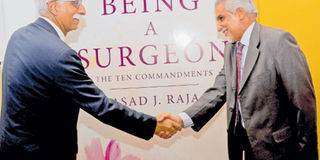Being a surgeon: Book asks the hard questions doctors face

Mr Firoz Rasul (left), president Aga Khan University, congratulates Prof Asad J. Raja (right), author, consultant general surgeon and chairman, Department of Surgery at Aga Khan University Hospital, Nairobi during the launch of his Being a Surgeon – The Ten Commandments. PHOTO | COURTESY
What you need to know:
- Raja traces his life as a surgeon from his early career days as a young doctor, struggling with the death of a patient, asking “What does it mean to be a surgeon?”
- He also talks of his practice in the United Kingdom, questioning the decision of a superior and confronting racism.
Things need to change in operating rooms, for the sake of surgical patients and the doctors caring for them. In his new book, Dr Asad Raja reflects on 40 years in the surgical ward, probing issues that are sometimes a matter of life and death.
Dr Raja is a professor and chairman of the Department of Surgery at The Aga Khan University (AKU) Hospital in Nairobi.
His new book, titled Being a Surgeon: The Ten Commandments, explores the most soul-searching dilemmas and ethical questions facing the medical profession.
While delivering a lecture on his practice at the launch last week, Dr Raja said: “Being a surgeon isn’t easy. Every day surgeons must battle to salvage a patient’s life, dignity and well-being in harsh environments. They must consider the complexity of medical professionalism, primacy of patient welfare, the duty of care, reflective practice, value judgments, conflict of interest, patient advocacy, justice and much more.”
Speaking at the book launch, AKU president Firoz Rasul said the book will guide new surgeons and practitioners as they develop and refine their sense of professionalism and ethics. “The book is one every surgeon can learn from, and one readers can enjoy even if they don’t know an Intensive Care Unit (ICU) from a High Dependency Unit (HDU),” he said.
Rasul said although Dr Raja is at the centre of his book, Being a Surgeon is the furthest thing from being self-centred. “Instead, it is a call to put the patient first, always. It is a call to remember that human dignity is the fundamental premise of our profession.”
Raja traces his life as a surgeon from his early career days as a young doctor, struggling with the death of a patient, asking “What does it mean to be a surgeon?” He also talks of his practice in the United Kingdom, questioning the decision of a superior and confronting racism.
In the end, the book intends to help surgeons and other stakeholders around the world make a difference in the care of surgical patients. It guides trainees and instructors to improve the culture and practices of surgery, urging them to fight the onslaught of institutionalised dehumanisation in medicine. It calls for a delve into the full, holistic complexity of the surgical discipline by exploring and cultivating every facet of the surgeon’s role.
The book has been published in the US by Trafford Publishing house and can be ordered online: www.Trafford.com/Bookstore. http://www.trafford.com/Bookstore.




